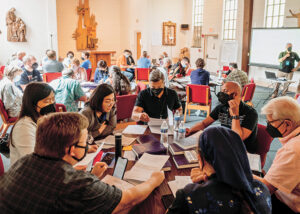In a previous Family Ties column on sexual ethics (June 19, 2017), I wondered, “Where does the Bible help us [in this regard]? And where is it limited?” As I wrote, I imagined some readers might share my questions, while others would be puzzled, even disturbed, by them. Like many of you, I imbibed Paul’s teaching to Timothy that “all Scripture is inspired by God and is useful for teaching, for reproof, for correction and for training in righteousness” (II Timothy 3:16).
Of course, Paul, writing in the first century A.D., was referring to the Hebrew Scriptures. The Christian Scriptures were not compiled and set into canon until the third century, or perhaps the fifth century, depending on which history one is following. Unity on Scripture was shaken up, along with many other things, by the Reformation, as Protestants omitted a number of books included by Roman Catholics.
Biblical history is full of much deliberation and debate. Those of us who value Scripture ought to become familiar with the fierce struggles that took place in its shaping, to determine what was sacred and should be included, and what was peripheral or heretical and therefore omitted.
Still we claim them as our holy writings. We trust the God-breath that worked through human hands and motivations to produce them and to guide us today, as they have countless others in the past. I persist and delight in engagement with Scripture, beginning most days with a psalm followed by a gospel passage. Such a rhythm grounds my little life in God’s unfathomable love, as intimate as breath, as vast as the ocean.
Questions persist. I ponder the opinion of my atheist friend, who thinks that an ancient book is woefully inadequate as a guide to ethics today. Part of me disagrees strongly, although I am not one to argue with an unbeliever. Part of me wants to point to Jesus, whose self-giving love ethic is magnificently compelling, timeless and exactly the model needed for the world in any age. How can the teachings of Jesus not inspire, guide and disturb anyone who considers them?
There is another part of me that understands my friend’s scepticism, what I call a hermeneutic of suspicion. My hermeneutic—how I interpret Scripture—has been shaped in many ways, including by my seminary studies. From feminist and liberation scholars, I acquired permission to approach Scripture with respectful critique. What does it mean that much of the Old Testament was written down by royal scribes, possibly during the years of Israel’s monarchy, possibly when Israel was in exile?
It is reasonable to assume that the writers were male and privileged, given gender roles, subsistence living conditions and scarcity of literary skills at the time. I know as a writer that there are many ways to tell a story. Our perspectives and our location in a society influence the story we tell or even the stories we think are worth telling. A hermeneutic of suspicion invites me to look at the Bible with curious eyes, asking, “Who is benefitting from the story being told this way? Who is being suppressed or disadvantaged?”
These questions have led me to a broadened appreciation for the Bible’s powerful message, particularly when interpreted by those who are weak, oppressed and marginalized. The God who brought liberation to the Hebrew slaves is still liberating and redeeming today. The God who broke open exclusionary divisions between Jews and Greeks is still inviting all peoples into the one universal family.
Perhaps suspicion is too strong a word for some lovers of the Bible. Perhaps caution or curiosity is more fitting, and can lead us to new insights.
Melissa Miller has a passion for helping people develop healthy, vibrant relationships with God, self and others.








Leave a Reply
You must be logged in to post a comment.